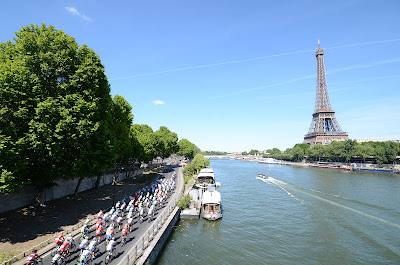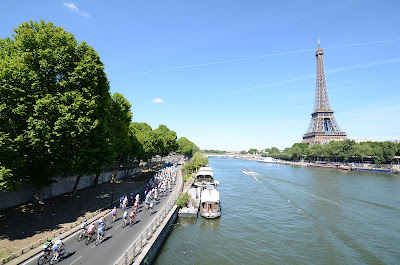During the the 2010 Tour de France, Alberto Contador returned an irregular blood sample in testing carried out in the town of Pau. In 2012 Alberto was handed a back dated 2 year ban and has lost his 2010 tour title and Giro. Alberto blames contaminated meat consumed at a team lunch on that rest day. This blog is dedicated to the butchers of Pau and the meats they supply
Saturday, December 15, 2012
Sunday, November 25, 2012
Friday, November 23, 2012
Tuesday, November 6, 2012
Did you know?
How close is doping and cycling linked you ask. Did you you know the Tour of California main sponsor is a company called Amgen, the maker of EPO......
read more
read more
Saturday, October 13, 2012
The one who said no - Scott Mercier
After Usada's full findings came out on Wednesday, Mercier's wife called him. "She said 'imagine you're sitting down with your son and daughter, explaining hey, daddy's a liar and a cheat'. I don't have to do that."
Read his story
Thursday, October 11, 2012
mike anderson
MY LIFE WITH LANCE ARMSTRONG
I was Lance’s personal assistant for two years, during the height of his racing career. Do I think he cheated? Yep. But my real problem is something that diehard fans seem unable to grasp: the vengeful tactics he uses against people who tell the truth about him, on and off the bike.
Outside online for story
He also dated Kate Hudson
"His [Armstrong's] goal [of winning the Tour de France multiple times] led him to depend on EPO, testosterone and blood transfusions but also, more ruthlessly, to expect and to require that his team-mates would likewise use drugs to support his goals if not their own.
"It was not enough that his team-mates give maximum effort on the bike, he also required that they adhere to the doping programme outlined for them or be replaced.
"He was not just a part of the doping culture on his team, he enforced and re-enforced it.
"Armstrong's use of drugs was extensive, and the doping programme on his team, designed in large part to benefit Armstrong, was massive and pervasive.
"Armstrong and his co-conspirators sought to achieve their ambitions through a massive fraud now more fully exposed. So ends one of the most sordid chapters in sports history."
- USADA
Monday, October 1, 2012
Thursday, August 30, 2012
Monday, August 27, 2012
new tdf champions
Meet your new TDF winners and a little background on each:
1999
No. 2 : Alex Zulle, Switzerland. His 1998 team, Festina, was ousted from the Tour that year in connection with the widespread use of the performance-enhancing drug EPO. Zulle later admitted to using the blood-booster over the four previous years. The Festina affair nearly derailed the 1998 Tour, and is widely seen as the first big doping scandal to jolt cycling.
No. 3: Fernando Escartin, Spain.
2000
No 2: Jan Ullrich, Germany. The 1997 Tour winner, a five-time Tour runner-up and longtime Armstrong rival. He was the top-name cyclist among at least 50 implicated in the "Operation Puerto'' police investigation in Spain in May 2006. Ullrich was stripped of his third-place finish from the 2005 Tour and retired from racing two years later. Earlier this year, he confirmed that he had had contact with Eufemiano Fuentes, a Spanish doctor at the center of that scandal, calling it a "big mistake'' - but did not admit to doping.
No. 3: Joseba Beloki, Spain. Implicated in Operation Puerto, he retired in 2007. He was reportedly cleared by a Spanish court of any involvement in the case.
2001
No 2: Ullrich.
No. 3: Beloki.
2002
No. 2: Beloki.
No. 3: Raimondas Rumsas, Lithuania. On the last day of the 2002 Tour, police stopped his wife, Edita, at the Italian border and searched her car, turning up suspected doping products. A French court later handed them four-month prison sentences on doping-related charges. The cyclist denied taking banned substances at that event, and all his tests came back negative. He said the products in his wife's car were for his mother-in-law. The next year, he was given a one-year ban after testing positive for EPO in the 2003 Giro d'Italia.
2003
No. 2: Ullrich.
No. 3: Alexandre Vinokourov, Kazakhstan. He later served a two-year doping suspension after twice testing positive for banned blood transfusions during the 2007 race. He won the Olympic road race in London last month and has announced plans to retire.
2004
No. 2: Andreas Kloeden, Germany. In 2009, an independent German probe alleged his Telekom and T-Mobile teams engaged in systematic blood doping from 1995 to 2006, and that he used illegal blood transfusions during the 2006 Tour. Kloeden has repeatedly denied doping.
No. 3: Ivan Basso, Italy. Excluded from the 2006 Tour because of his involvement in Operation Puerto. He claimed that he gave his blood to Fuentes - the Spanish doctor at the center of that scandal - but never used it. Later that year, Basso received a two-year doping ban; he later returned, and won his second Giro d'Italia in 2010.
2005
No. 2: Basso.
No. 3: Ullrich.
Source: http://sportsillustrated.cnn.com/2012/cycling/wires/08/25/2080.ap.cyc.armstrong.tour.runners.up.0633/index.html#ixzz24l5ZlKe1
1999
No. 2 : Alex Zulle, Switzerland. His 1998 team, Festina, was ousted from the Tour that year in connection with the widespread use of the performance-enhancing drug EPO. Zulle later admitted to using the blood-booster over the four previous years. The Festina affair nearly derailed the 1998 Tour, and is widely seen as the first big doping scandal to jolt cycling.
No. 3: Fernando Escartin, Spain.
2000
No 2: Jan Ullrich, Germany. The 1997 Tour winner, a five-time Tour runner-up and longtime Armstrong rival. He was the top-name cyclist among at least 50 implicated in the "Operation Puerto'' police investigation in Spain in May 2006. Ullrich was stripped of his third-place finish from the 2005 Tour and retired from racing two years later. Earlier this year, he confirmed that he had had contact with Eufemiano Fuentes, a Spanish doctor at the center of that scandal, calling it a "big mistake'' - but did not admit to doping.
No. 3: Joseba Beloki, Spain. Implicated in Operation Puerto, he retired in 2007. He was reportedly cleared by a Spanish court of any involvement in the case.
2001
No 2: Ullrich.
No. 3: Beloki.
2002
No. 2: Beloki.
No. 3: Raimondas Rumsas, Lithuania. On the last day of the 2002 Tour, police stopped his wife, Edita, at the Italian border and searched her car, turning up suspected doping products. A French court later handed them four-month prison sentences on doping-related charges. The cyclist denied taking banned substances at that event, and all his tests came back negative. He said the products in his wife's car were for his mother-in-law. The next year, he was given a one-year ban after testing positive for EPO in the 2003 Giro d'Italia.
2003
No. 2: Ullrich.
No. 3: Alexandre Vinokourov, Kazakhstan. He later served a two-year doping suspension after twice testing positive for banned blood transfusions during the 2007 race. He won the Olympic road race in London last month and has announced plans to retire.
2004
No. 2: Andreas Kloeden, Germany. In 2009, an independent German probe alleged his Telekom and T-Mobile teams engaged in systematic blood doping from 1995 to 2006, and that he used illegal blood transfusions during the 2006 Tour. Kloeden has repeatedly denied doping.
No. 3: Ivan Basso, Italy. Excluded from the 2006 Tour because of his involvement in Operation Puerto. He claimed that he gave his blood to Fuentes - the Spanish doctor at the center of that scandal - but never used it. Later that year, Basso received a two-year doping ban; he later returned, and won his second Giro d'Italia in 2010.
2005
No. 2: Basso.
No. 3: Ullrich.
Source: http://sportsillustrated.cnn.com/2012/cycling/wires/08/25/2080.ap.cyc.armstrong.tour.runners.up.0633/index.html#ixzz24l5ZlKe1
Tuesday, July 24, 2012
Subscribe to:
Posts (Atom)



























































